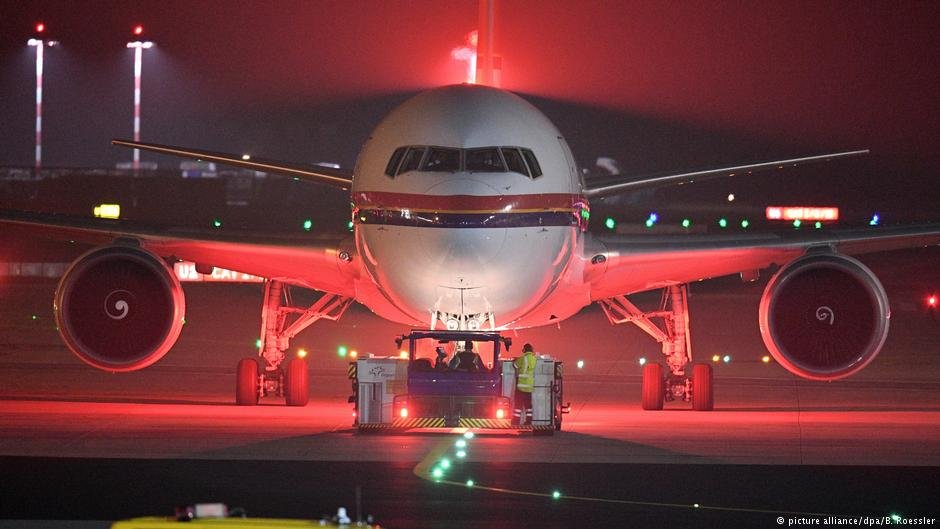Last year, German authorities sent more than 16,000 requests to Croatia to accept rejected asylum seekers who first got registered in Croatia. But only one in 50 of all planned deportations were actually carried out. This year, however, the number of deportations to other EU countries from Germany is on the rise.
Only 328 people were returned to Croatia from Germany under the Dublin Regulation last year -- despite Germany wanting to return close to 17,000. That's according to figures from Germany's Federal Office for Migration and Refugees (BAMF).
In other words, less than two percent of all desired deportations to fellow EU country Croatia were actually carried out in 2023.
At a press conference in Croatia's capital Zagreb on Wednesday (November 27), Croatia's Interior Minister Davor Božinović didn't comment on how many of the 16,704 requests Croatian authorities confirmed or rejected, DW's Croatian service reported.
Božinović did, however, say that Germany has announced 1,519 Dublin deportations to Croatia for this year, of which 401 have been carried out so far. An additional 182 persons are to be returned by the end of the year. Even if close to 600 deportations materialize, only a good third of the 1,519 deportations announced by Germany would actually be followed through with.
With 16,704 deportation requests, Croatia last year topped the list of countries Germany wanted to return migrants to, followed by Italy (15,749) Austria (7,995), Bulgaria (7,732), Greece (5,523) and France (5,032).
The Dublin Regulation (also referred to as Dublin III) is European Union law. It determines which country is responsible for examining an asylum application -- normally the country where the asylum seeker first entered Europe.
One of the aims of the Regulation is to ensure that an individual does not make multiple applications for asylum in several Dublin member states. These include the member countries of the EU plus Iceland, Norway, Switzerland and Liechtenstein. The UK is no longer bound by the Dublin Regulation.
Read AlsoSomalia and Germany announce deportation deal

Deportations to Croatia from Bavaria
Responding to an inquiry by DW's Croatian service, the Asylum and Migrant Return Service of the German state of Bavaria said that a total of five charter flights left for Croatia between January 1, 2023 and September 30, 2024 with a total of 21 persons.
The deportees included not only rejected asylum seekers and persons without a regulated residence permit from the territory of Bavaria, but also from some other federal states.
According to data from October 31 of this year, there were a total of 25,646 people in the territory of Bavaria who, for one reason or another, were obliged to leave the country, DW's Croatian service reported. Among them are 460 citizens of the Republic of Croatia.
Read AlsoDeportation pressure undermines refugee job integration, warns Bavarian Refugee Council
Overall number of deportations on the rise
In 2023, German authorities wanted to deport 74,622 people to other EU countries under the Dublin Regulation. Although other EU countries agreed to take over 55,000 of these Dublin cases, only 5,053 people were actually returned there from Germany last year, according to BAMF data.
In other words, one in 11 deportations to other EU countries were actually carried out. In the first half of 2024, the ratio was roughly one in seven (3,500 vs 40,000).
The countries Germany deported the most people to last year were Austria, France, Spain and Croatia. In terms of deportees' nationalities, the main countries of origin were Afghanistan, Syria, Turkey, Russia and Iraq.
The overall number of deportations to other countries, meanwhile, continues to rise.
In the first half of 2024, close to 10,000 people were deported from Germany according to the Interior Ministry -- already almost twice as many as in all of last year. A good third of them (some 3,500) were deported to other EU countries, DW's Croatian service reported citing BAMF information.
In September, Germany's coalition government unveiled a new bill to expedite deportations and curb knife crime. The move came after a deadly stabbing in August.
Read AlsoWho is at risk of deportation from Germany?
This article is based primarily on an article written by Srećko Matić for DW's Croatian service
